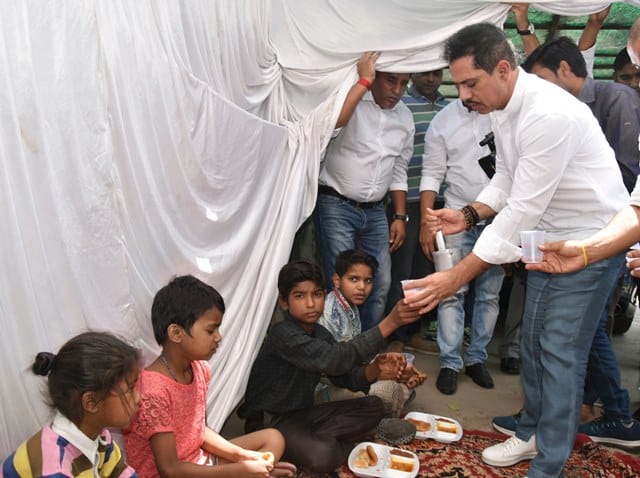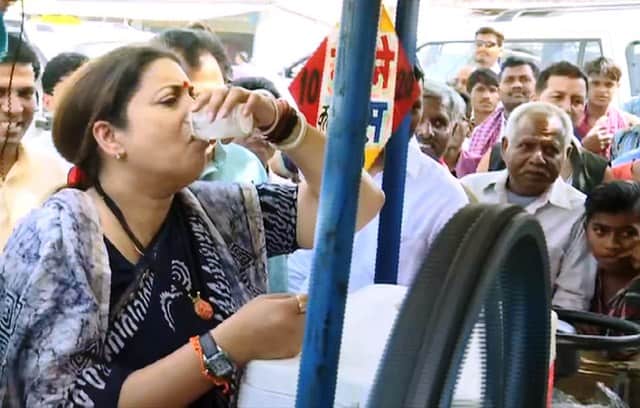
Month: April 2019

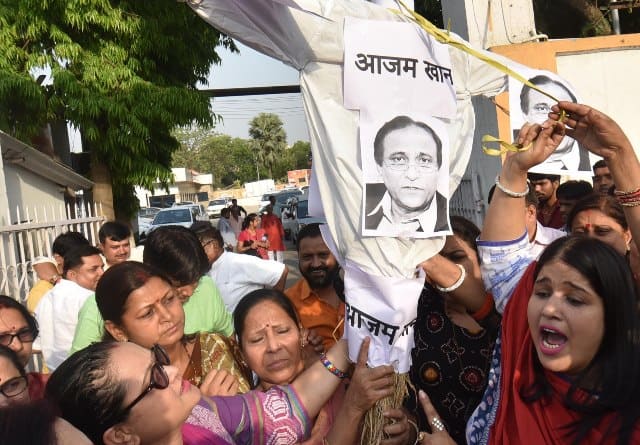
BJP Women Wing Burns Azam Khan's Effigy
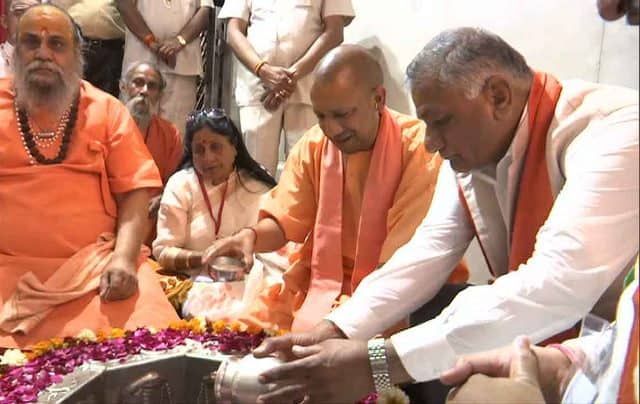
EC Cracks The Whip On Yogi, Mayawati
The bar comes into force from 6 am on April 16.
Election Commission citing Article 324 of the Constitution has barred both Mayawati and Yogi Adityanath from holding any public meetings, public processions, public rallies, road shows and interviews, public utterances in media (electronic, print and social media) in connection with the ongoing elections.
The EC took action after it issued show-cause notices to both the leaders in the case of respective violation of MCC.
The Commission observed: “Mayawati in her impugned speech, has appealed to secure votes on religious lines that tantamount to violation of provisions of ‘General Conduct’ of “Model Code of Conduct, for the guidance of political parties and candidates”. Mayawati made the objectionable statements during the public rally on April 7 at Deoband, Saharanpur.
While Yogi Adityanath made some objectionable statements during a public rally at Meerut on April 9. EC said that the Uttar Pradesh Chief Minister has accepted using reference of “Hara Virus” and “Bajrangbali” in his speech.
“Commission observes that being a senior leader, Adityanath should have desisted himself in making statements that have the undertone and propensity to polarize the election, which is not confined to the constituency only where the statement is made, but to the other parts as well due to dissemination of information in this digital age,” the EC said.
(ANI)
]]>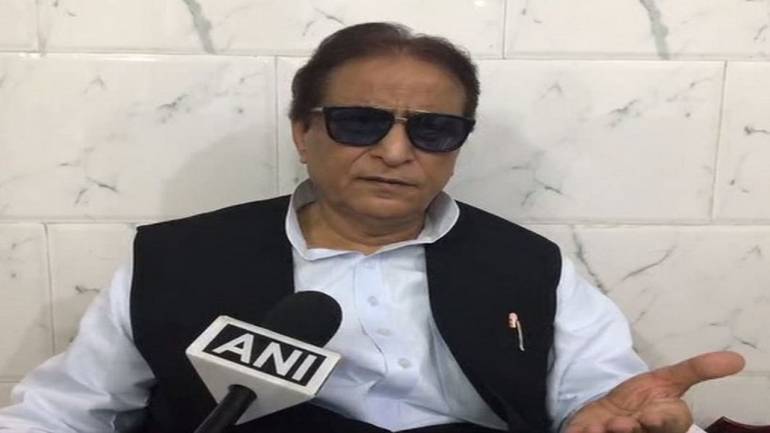
FIR, Outrage Over Azam's Sexist Words
Uttar Pradesh Chief Electoral Officer has also taken cognizance of the derogatory remarks and has sought a report on it. The National Commission for Women (NCW) has also sent a notice to Khan over the remark.
Addressing a rally in the presence of Samajwadi Party president Akhilesh Yadav, Azam Khan in a disparaging remark said, “I brought her (Jaya Prada) to Rampur. You are a witness that I did not allow anyone to touch her body. It took you 17 years to identify her real face but I got to know in 17 days that she wears khaki underwear.”
However, asserting that he did not name anyone, the SP leader later said that he would withdraw his candidature from the ongoing polls if proved guilty.
“I have said that people took time to know the real face in reference to a man who once said that he brought 150 rifles with him and if he saw Azam, he would shoot him dead. My leaders also did a mistake. Now, it has been revealed that he has an RSS pant on his body. Short is worn by men,” Khan told ANI on Sunday.
Akhilesh, meanwhile, has maintained silence over the snide remark by his party’s senior leader and has instead shared images of the same rally. Taking to his twitter account on Monday morning, Yadav shared pictures of him alongside Khan, in an apparent show of support for the Rampur legislator.
Jaya Prada, who is contesting from Rampur on BJP’s ticket, has earlier represented the constituency as a Samajwadi Party lawmaker.
Union minister Sushma Swaraj, drawing a comparison between mythological character Bhishma Pitahmah and Samajwadi Party (SP) founder Mulayam Singh Yadav, sought the patriacrch’s response on Khan’s sexist comment.
Referring to Draupadi’s cheer-haran (disrobing) – a scene from epic Mahabharata in which Pandavas lost a bet to their usurping cousins – Swaraj appealed Mulayam to not remain silent on the matter.
J-K chief minister Mehbooba Mufti on Monday said in Anantnag, Kashmir: “The Election Commission of India (ECI) is doing good work. It should also take strict action against the statement made by Azam Khan about Jaya Prada.”
(ANI)
]]>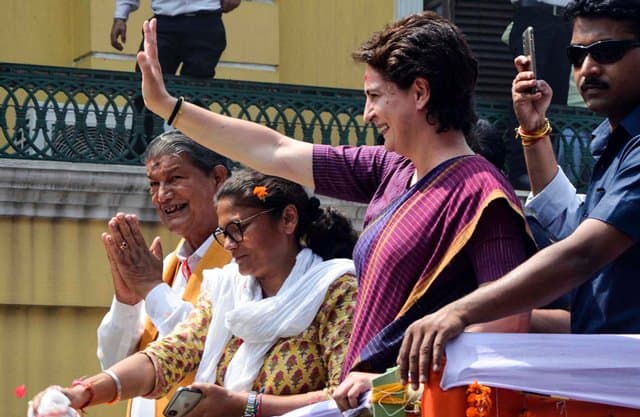
Priyanka Gandhi Holds Raodshow In Silcher
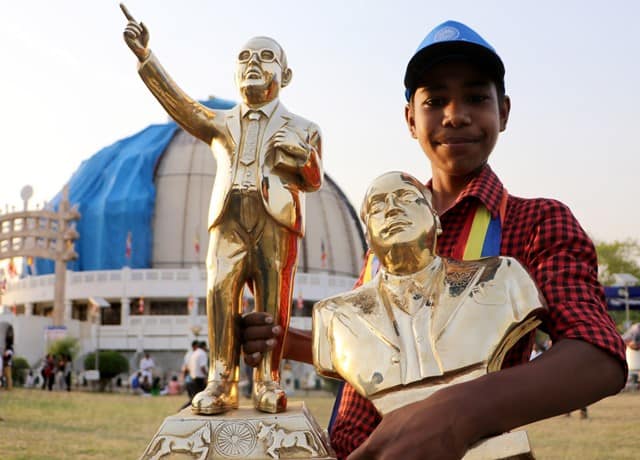
A Buddhist Devotee Holds Ambedkar Statues

Azam Makes Vulgar Comment On Jaya Prada
“I brought her (Jaya Prada) to Rampur. You are a witness that I did not allow anyone to touch her body. It took you 17 years to identify her real face but I got to know in 17 days that she wears khaki underp****,” said Khan while addressing an election rally in Rampur.
Khan, who is in the fray from Rampur on the SP ticket, made the obnoxious remark in the presence of former chief minister Akhilesh Yadav and other senior party leaders, who were present on the dais.
“BJP candidate! You told TV channels after performing ‘puja’ that there is a ‘daanav’ in Rampur. I have to finish. I did not know what ‘daanav’ meant. My Hindu friends told me that it means ‘rakhshas,” said Khan.
“Remember for two people I was expelled from the SP. I did not rebel. I did not complain and I waited. I did not change the boat,” he said.
Urging people to stay united, the Samajwadi Party leader said: “Hug Dalits because injustice has been done to them for thousands of years. Think and decide but once you decide, don’t go back. Stay united and you will see that the throne from here to Delhi will be yours.”
“It is not a question of victory or defeat. It is not even a question of my victory or defeat. The question is if the change will happen in the country or not,” he said.
“Let one Azam Khan get sacrificed but (Prime Minister Narendra) Modi’s cruel rule must go way. Those who make Ali-Bajrang Bali fight, their rule should go,” he said.
The election for 80 Lok Sabha seats in the state is scheduled to be conducted in all seven phases. Eight seats in the state went to polls in the first phase on April 11. The final phase of voting will take place on May 19. The results will be announced on May 23.
(ANI)
]]>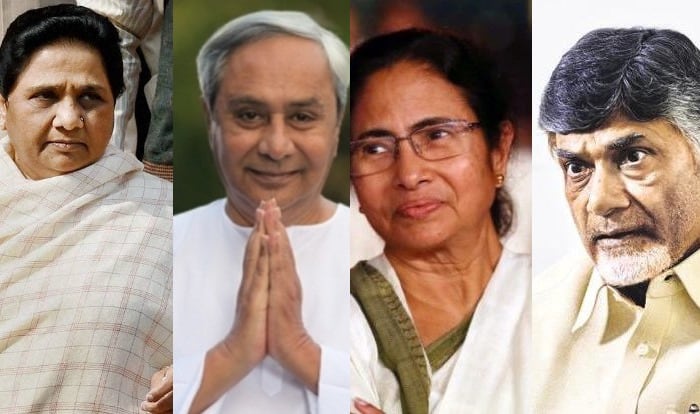
Do Regional Parties Hold The Key?
While the various pre-poll surveys for the upcoming Lok Sabha election have predicted that the Bharatiya Janata Party-led National Democratic Alliance has an edge over its opponents, they have also forecast that “others” or regional parties not aligned with either the saffron party or the Congress, can win anywhere between 100 to 138 seats.
The performance of these regional parties needs to be watched closely as they could well play a crucial role in deciding who forms the next government if neither the BJP-led alliance nor the coalition stitched up by the Congress is unable to cross the half-way mark in the 543-member Lok Sabha. The regional parties do not have a wide-enough presence to form a government on their own but they are certainly in a position to play kingmaker in case of a hung Lok Sabha.
The “non-aligned” regional parties can be broadly clubbed into two categories. The Biju Janata Dal, led by Odisha chief minister Naveen Patnaik, the Telangana Rashtra Samithi, headed by Telangana chief minister K Chandrasekhar Rao and YSR Congress Party’s Jagan Mohan Reddy in Andhra Pradesh. All the three parties maintain they are equidistant from the two national parties but will have no qualms in going with the winner.
In fact, it is informally accepted by BJP leaders that these three parties will be amenable to a post-poll deal with them if their alliance falls short of the requisite numbers. From all accounts, the three parties are well-placed in their respective states and their leaders have not given any reason to believe that they will not be willing to do business with the BJP if it comes back to power.
The second category of regional parties includes Mayawati’s Bahujan Samaj Party, Akhilesh Singh Yadav-led Samajwadi Party, N Chandrababu Naidu’s Telugu Desam Party and Mamata Banerjee’s Trinamool Congress. Their home states – Uttar Pradesh, West Bengal and Andhra Pradesh – collectively account for 147 Lok Sabha seats.
It is expected that these regional satraps will not align with the BJP and will instead drive a hard bargain with the Congress-led alliance after the elections. This will, of course, depend on the final tally and whether this grouping is in a position to form the government.
This was evident from Mamata Banerjee’s speech at an election rally in West Bengal’s Raiganj constituency on April 9 where she declared that the Congress will not be able to form a government on its own and that “the Rahul Gandhi-led party will have to seek help from others if it wants to form a government at the Centre”. The Trinamool chief is playing to win a maximum of the 42 Lok Sabha seats in her home state West Bengal so that she is in a position to call the shots after elections and, maybe, position herself as a Prime Ministerial candidate. To improve her acceptability outside West Bengal, Banerjee has directed that her party’s press conferences held in Delhi be conducted in Hindi. One such press meet was held on the eve of the first phase of elections on April 11.
All attention is currently focused on former bitter political rivals in UP, the BSP and the SP, who have now joined hands along with Ajit Singh’s Rashtriya Lok Dal to take on the BJP in the electorally crucial state. They have deliberately kept the Congress out of this alliance as they would like to maximize their gains in the election to be able to negotiate from a position of strength after the polls.
It has become imperative for this grand alliance (maha-gathbandhan) to succeed on the ground not only because the survival of the regional parties is at stake but also to weaken the BJP in Uttar Pradesh where the party bagged 71 of the 80 seats in the 2014 Lok Sabha polls. Though the BSP failed to win a single seat and the SP was reduced to four seats thanks to the Modi wave, the two parties have posted good results in the past.
A good showing by these regional forces this time will improve their political fortunes in Uttar Pradesh and, at the same time, give them an opportunity to decide who forms the next government at the Centre. Like Mamata Banerjee, Mayawati is also looking to play a larger national role. Though her party’s vote share has been declining, the BSP has fielded candidates across states to bump up her tally by garnering a sizeable number of Dalit votes. Mayawati made her intention clear when she told her party cadre recently that she may have decided to keep away from the electoral fray but this will not impede her chances of becoming Prime Minister as she has the option of contesting a Lok Sabha election within a period of six months.
Chandrababu Naidu is pragmatic enough to realise that he is not in the race for the Prime Minister’s post but he certainly has ambitions of playing a kingmaker at the Centre. After he parted company with the BJP over his demand to secure special status for Andhra Pradesh, Naidu has made consistent efforts to bring together opposition parties on a common platform. He played a similar role in 1996 when a set of regional parties formed the government at the Centre by cobbling together a coalition. The hurriedly forged United Front forced the Congress to lend it outside support in order to keep the BJP out.
Naidu, who was the convener of the United Front, has now predicted that 1996 will be repeated this year. In other words, he is convinced that regional forces will be at centre stage while the Congress will be the pivot of this grouping. The game plan of the regional parties is self-evident. They want to be in the driver’s seat and want the Congress to align with them but on their terms.
Regional parties have realized their potential ever since coalition politics became a recurring feature of Indian polity in the late eighties. Having a presence at the Centre gives the regional leaders a place at the high table, helps them push the interests of their respective states and even influence national policy.
For instance, Mamata Banerjee walked out of the Manmohan Singh government in protest against its policy to open up the retail sector for foreign direct investment. Similarly, the Trinamool chief did not allow India to sign the Teesta river water sharing treaty with Bangladesh on the ground that it did not favour West Bengal. Regional autonomy and preserving the country’s federal structure are the buzz words in a coalition era. But, most important, a role at the Centre also ensures personal protection for the regional satraps and their party members as many of them are guilty of misdemeanors and need necessary legal safeguards.
]]>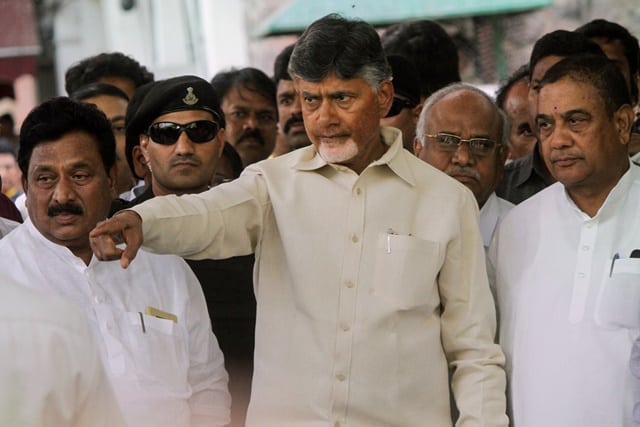
Naidu Files Review Petition On Faulty EVM
